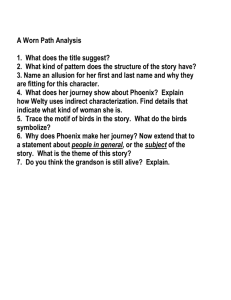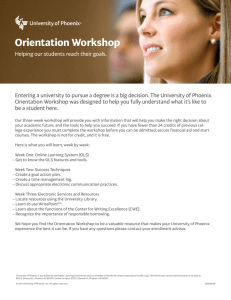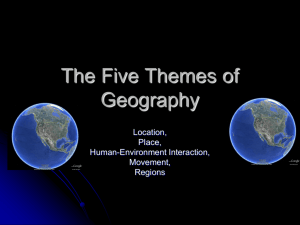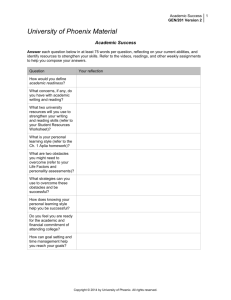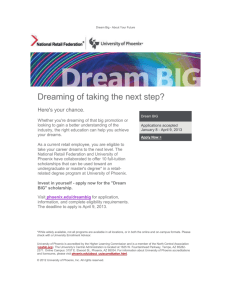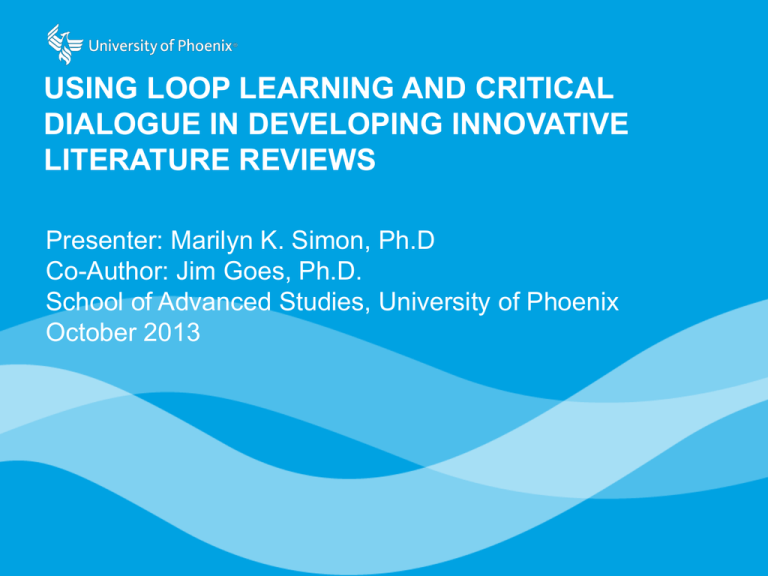
USING LOOP LEARNING AND CRITICAL
DIALOGUE IN DEVELOPING INNOVATIVE
LITERATURE REVIEWS
Presenter: Marilyn K. Simon, Ph.D
Co-Author: Jim Goes, Ph.D.
School of Advanced Studies, University of Phoenix
October 2013
Graduate Studies
• Old Adage: More and more about less and less
• Eventually know everything about nothing.
• Good news/Bad news
• Literature review.
© 2012 University of Phoenix, Inc. | All rights reserved
Page
2
The Scholarly Literature Review
• A comprehensive, fully developed literature review is the foundation
and starting point for scholarly research, and one of the most
important tasks in dissertation development. Pre-requisite for doctoral
research.
• Literature reviews often suffer from bounded, linear –wikipeida like
thinking, limited scope, and little effort to go outside of the existing
literature on a topic, in content, analysis, and synthesis. Little
attention in grad school
• Extensive, not exhaustive
• Challenging in traditional
programs; more so in online setting
© 2012 University of Phoenix, Inc. | All rights reserved
Page
3
Emphasis
• Methodology
• APA formatting
• Plagiarizing
• Data Analyses
• Key word searches
© 2012 University of Phoenix, Inc. | All rights reserved
Page
4
Purpose of a Literature Review
• Justification
• Substantiate gap in the existing literature.
• Analysis/synthesis of scholarly literature
• ROC bottom test justification.
• A researcher cannot perform significant research without first
understanding the literature in the field (Boote & Biele, 2005).
© 2012 University of Phoenix, Inc. | All rights reserved
Page
5
Quality Literature review: UoP/SAS
Search criteria and scope is explicit and justified
Criteria for material inclusion and exclusion are clear and justified
Demonstrates a purposeful and thorough inclusion of material
Demonstrates comprehensiveness: breadth, relevance, currency, availability, and authority
Demonstrates comprehensiveness: depth (including alternative and conflicting perspectives)
Discussion is supported by relevant, scholarly, and peer-reviewed sources
© 2012 University of Phoenix, Inc. | All rights reserved
Page
6
Mind-mapping First Step – Key word search
© 2012 University of Phoenix, Inc. | All rights reserved
Page
7
Keyword Search
• A basic keyword search follows this syntax:
• <your keyword> <your keyword>
• cats scratching: This search retrieved 49 results in EBSCOhost.
• You can narrow down the number of results you get by using
more keywords:
• cats scratching allergy
• This search retrieved 2 results in EBSCOhost
• You can expand the number of results you get by using
synonyms and truncation:
• (cats or kittens) scratch*
• This search retrieved 548 results in EBSCOhost.
© 2012 University of Phoenix, Inc. | All rights reserved
Page
8
Single Loop Literature Review
Standard Review Format:
1. Single-loop learning model
following Argyris (1994)
2. Identify a gap in the literature, and
conduct research to improve a
given situation
3. Focus on problem solving by
seeking supportive views
4. Generates little new insight into
known problems because of
the limited perspective of the
search and analysis.
5. Wikipedia-like: Example: case for
character education
© 2012 University of Phoenix, Inc. | All rights reserved
Page
9
Single Loop Example
• Example: Study the
efficacy of caffeine intake
while conducting scholarly
research.
• Search is designed,
intentionally or not, to
support researcher’s view
• Potential for cultural bias
© 2012 University of Phoenix, Inc. | All rights reserved
Page
10
An Annotated Bibliography is not a Lit Review
• Concise summaries
• Little integration
Presented in a linear
or chronological
fashion
• Literature connections
support the study
© 2012 University of Phoenix, Inc. | All rights reserved
Page
11
Scholarly Debate and Double Loop Learning
• Review is widened to consider
opposing views
• 180 degree review
• Active search for opposing/
outside views on the issue
• However opposing/outside views
usually receive greater critical
scrutiny, potentially biasing
results (Gilovich,1991).
• e.g. In a debate over
character education, someone
wins and someone loses
© 2012 University of Phoenix, Inc. | All rights reserved
Page
12
Dialogue and Convergence –
Triple Loop Learning
• Single Loop – Problem Solving
(I’m hungry, I need food, give me a
fish, I eat for a day) Problem solved.
• Double Loop – Problem Reframing
(I need to eat regularly, teach me to
fish, overcome challenges of
recurrent hunger and fishing… I will
be able to eat more often)
• Triple Loop – Problem Convergence
(What else can I eat besides fish?
sustenance and satiation)
© 2012 University of Phoenix, Inc. | All rights reserved
Page
13
Triple Loop Learning – Literature Review
• A profound understanding of our own and others beliefs,
perceptions, and understandings.
• Peschl (2007) proposed that triple-loop learning is a type
of double-loop thinking about double-loop learning.
• Not only pro and con arguments, but questioning:
– Are we studying the right issue?
– right way?
– right time.
• Engage researchers in each other studies.
© 2012 University of Phoenix, Inc. | All rights reserved
Page
14
Chris Argyris. Model
© 2012 University of Phoenix, Inc. | All rights reserved
Page
15
Literature Review & Triple Loop Learning
1. Understand how problems and solutions are related,
even when separated by time and space
2. Understand why previous actions led to current
problems (Situatedness*).
3. Uncover and question premises and cognitive patterns
4. Synthesize new perspectives to emerge, and
5. Establish a rationale for new research
* Polanyi, M. (1998 [orig.1958]). Personal Knowledge: Towards a Post-Critical Philosophy. London,
Routledge.
© 2012 University of Phoenix, Inc. | All rights reserved
Page
16
More like a conversation between Authors where new ideas
are generated. These authors are toasting you as the
newest member of the team; respect for ideas. AVATARs
© 2012 University of Phoenix, Inc. | All rights reserved
Page
17
Experiential Learning with Triple Loop Learning
Problem: School Violence
• Proposed Study: Delphi survey of experts, advocates
about what can be done to Stop School Violence
• Brainstorm with a group of Colleagues
• Create a mindmap on areas to research
• Present potential single, double, triple loop learning
strategies
• Assess situatedness, dialogue with participants until
convergence is reached
© 2012 University of Phoenix, Inc. | All rights reserved
Page
18
Stop School Violence
• What can be done to stop school violence?
(mind-map – one idea)
• Single-Loop: What can be done to stop school
violence? Generate support for idea
• Double-Loop: Pros and Cons – Support - Refute
idea
• Triple-Loop: Situatedness – what is the context?
• Loop ideas to others
© 2012 University of Phoenix, Inc. | All rights reserved
Page
19
How does this map compare to yours?
© 2012 University of Phoenix, Inc. | All rights reserved
Page
20
Creating an Innovative and Scholarly Review of the
Literature Triple Loop Dialogic Processing
• The task is to orchestrate the voices and ideas of many
into a form of textual unity.
• Parts Whole, Whole Parts
• Framework for relating new findings and a profound
understanding of how new research can advance prior
research.
• Deep knowing profound change/innovation - Peschl
© 2012 University of Phoenix, Inc. | All rights reserved
Page
21
References
Argyris, C.,1994, July. Good communication that blocks learning. Harvard Business Review.
Argyris, C., Putnam, R., & McLain Smith, D., 1985. Action science: concepts, methods, and skills for research and
intervention. San Francisco: Jossey-Bass
Bakhtin, M. ,1973. Problems of Dostoevsky's poetics (R. D. Rotsel, Trans.). New York, NY: Ardis.
Bohm, D. ,1996. On dialogue. New York, NY: Routledge.
Boote, D., & Biele, P. ,2005. Scholars before researchers: On the centrality of the dissertation literature review in
research preparation. Journal: Educational Researcher, 34(6), 3-15. doi:10.3102/0013189X034006003
Buber, M. ,1996. The letters of Martin Buber: A life of dialogue. Syracuse, NY: Syracuse University Press.
Cooper, H. ,1988. Organizing knowledge synthesis: A taxonomy of literature reviews. Knowledge in society (1), 104106.
Canales, J. ,2010. Comparative neuroscience of stimulant-induced memory `dysfunction: role for neurogenesis in the
adult hippocampus, Behavioural Pharmacology, 21, 5-6, 379
Ellinor, L., & Gerard, G. ,1998. Dialogue: Rediscover the transforming power of conversation. London, England: Wiley.
Franklin, S. P.,1995. Artificial minds. MIT Press, Cambridge, Mass
Gilovich, T. ,1991. How we know what isn't so: The fallibility of human reason in everyday life. New York, NY:
Macmillan.
Isaacs, W. N. ,1993. Taking flight: Dialogue, collective thinking, and organizational learning. Organizational Dynamics,
22(2), 24-39.
Isaacs, W.N. ,1999. Dialogue and the art of thinking together: A pioneering approach to communicating in business and
in life. New York, NY: Bantam Doubleday Dell.
© 2012 University of Phoenix, Inc. | All rights reserved
Page
22
References
Kabat-Zinn J. ,2003. Mindfulness-based interventions in context: Past, present, and future. Clinical Psychology:
Science and Practice. 10:144–156.
Lindblom J. & Ziemke T. ,2003. Social situatedness of natural and artificial intelligence: Vygotsky and beyond. Adaptive
Behavior, 11 (2): 79-96.
Myers, D. G. ,2004. Psychology. New York, New York: Worth Publishers.
Peschl, M. F.,2007. Triple-loop learning as foundation for profound change, individual cultivation, and radical innovation.
Construction. Retrieved from http://cogprints.org/6161/1/pesc07_
Polanyi, M. (1998 [orig.1958]). Personal Knowledge: Towards a Post-Critical Philosophy. London, Routledge
Richardson, V. ,2003. The Ph.D. in education. Retrieved from http://www.carnegiefoundation.org/CID/essays
/CID_educ_Richardson.pdf
Rogers,P. Hohoff, C. Heatherley, S. Mullings, Maxfield, P Evershed, R. Deckert. J. and Nutt. D. (2010) Association of
the Anxiogenic and Alerting Effects of Caffeine with ADORA2A and ADORA1 Polymorphisms and Habitual Level of
Caffeine Consumption. Neuropsychopharmacology, DOI: 10.1038/npp.2010.71.
Shulman, L. S. ,1999. Professing educational scholarship. In E. C. Lagemann & L. S. Shulman (Eds.), Issues in
education research: Problems and possibilities (pp. 159-165). San Francisco, CA: Jossey-Bass.
Slavin, R. E. ,1986. Best-evidence synthesis: An alternative to meta-analysis and traditional reviews. Educational
Researcher, 15(9), 5-11.
Simon, M. K., & Goes, J. ,2013. Dissertation and scholarly research: Recipes for success (2013 ed.). Seattle, WA:
Dissertation Success. Retrieved from http://dissertationrecipes.com/
Trede, F.; Higgs, J. & Rothwell, R. ,2008. Critical Transformative Dialogues: A Research Method Beyond the Fusions
of Horizons [37 paragraphs]. Forum Qualitative Sozialforschung / Forum: Qualitative Social Research, 10(1),
Usher, R., & Bryant, I. ,1989. Adult education as theory, practice and research. London, England: Routledge.
© 2012 University of Phoenix, Inc. | All rights reserved
Page
23

